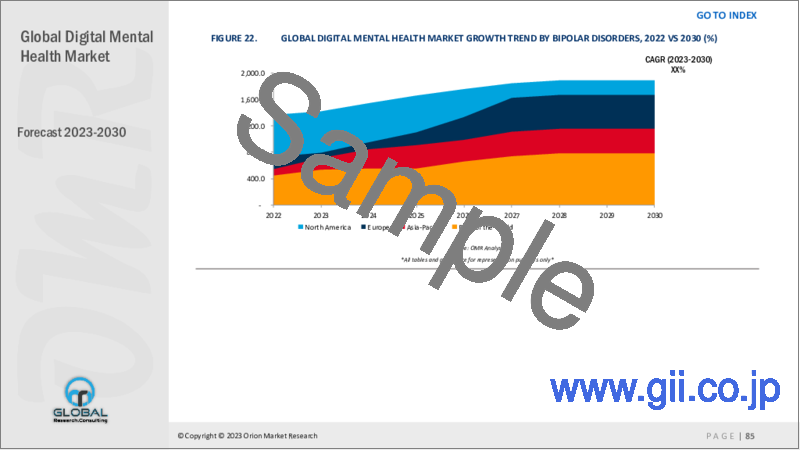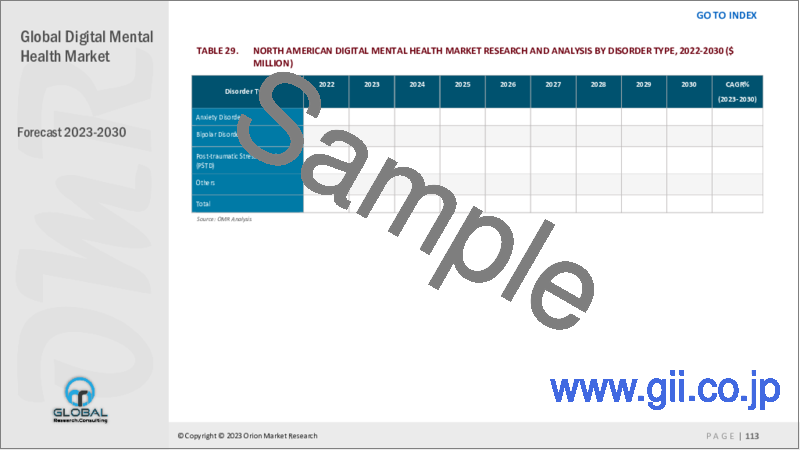|
|
市場調査レポート
商品コード
1296856
デジタルメンタルヘルスの世界市場2023-2030Global Digital Mental Health Market 2023-2030 |
||||||
カスタマイズ可能
|
|||||||
| デジタルメンタルヘルスの世界市場2023-2030 |
|
出版日: 2023年05月24日
発行: Orion Market Research
ページ情報: 英文 110 Pages
納期: 2~3営業日
|
- 全表示
- 概要
- 図表
- 目次
世界のデジタルメンタルヘルス市場は、予測期間中にCAGR 20.3%の大幅な成長が見込まれています。行動健康治療とメンタルヘルスサービスに対する需要の増加は、デジタルメンタルヘルス市場の成長に道を開く。また、メンタルヘルスアプリの利用が増加し、神経疾患の急増と相まって、市場成長の原動力となっています。疾病管理予防センターによると、何らかのメンタルヘルス治療を受けたことのある成人の割合は2021年に増加し、全年齢の成人では2019年の19.2%から2021年には21.6%に、18~44歳では2019年の18.5%から2021年には23.2%に増加しました。さらに、モンマス郡メンタルヘルス協会によると、約5000万人、20%のアメリカ人が精神疾患を経験しており、精神疾患を持つ成人の半数以上が治療を受けていません。
メンタルヘルスの問題に対する認識と社会的受容の高まりは、オンライン・コンサルティングやデジタル化された認知行動療法などのデジタル・メンタルヘルスのサービスによって促進されるであろう有利な市場機会を提供します。
セグメント別の展望
市場セグメンテーションでは摂食障害分野が大きなシェアを占める
障害のタイプ別に見ると、摂食障害分野は大きな成長が見込まれています。摂食障害の症例数の増加と、規制機関によって組織された数多くの取り組みやプログラムが、このセグメントの成長を後押ししています。2022年2月、提案された摂食障害・身体イメージ部門は摂食障害啓発週間を発表しました。この啓発週間は、摂食障害について一般の人々を教育し、摂食障害の影響を受けている人々に支援と可視性を提供することを目的としています。
地域別展望
北米地域が世界のデジタルメンタルヘルス市場で大きなシェアを占めると予測
デジタルメンタルヘルスの世界市場において、北米地域が大きなシェアを占めると予測されています。市場成長の原動力となっているのは、先端技術の採用の増加、人々のメンタルヘルスに対する意識の高まり、企業で働く専門家の急増などです。米国労働省によると、2021年には米国成人の5人に1人が毎年精神的な健康状態を経験し、その大多数は働き盛りであり、COVID-19の大流行時には、米国成人の間で報告された不安や抑うつの症状が顕著に増加しました。
目次
第1章 レポート概要
- 業界の現状分析と成長ポテンシャルの展望
- 調査方法とツール
- 市場内訳
- セグメント別
- 地域別
第2章 市場概要と洞察
- 調査範囲
- アナリストの洞察と現在の市場動向
- 主な調査結果
- 推奨事項
- 結論
第3章 競合情勢
- 主要企業分析
- Cambridge Cognition Ltd.
- 概要
- 財務分析
- SWOT分析
- 最近の動向
- CareTech Holdings Ltd.
- 会社概要
- 財務分析
- SWOT分析
- 最近の動向
- Siemens Medical Solutions USA, Inc.
- 概要
- 財務分析
- SWOT分析
- 最近の動向
- 主要戦略分析
第4章 市場セグメンテーション
- デジタルメンタルヘルスの世界市場:タイプ別
- テレセラピー
- トラッキング&セルフヘルプアプリ
- 瞑想アプリ
- デジタル治療薬
- デジタルメンタルヘルスの世界市場:コンポーネント別
- ソフトウェア
- サービス
- デジタルメンタルヘルスの世界市場:障害タイプ別
- 不安障害
- 双極性障害
- 心的外傷後ストレス障害(PSTD)
- その他(うつ病、摂食障害)
- デジタルメンタルヘルスの世界市場:エンドユーザー別
- 病院
- メンタルヘルスケアセンター
- 研究機関
第5章 地域別分析
- 北米
- 米国
- カナダ
- 欧州
- 英国
- ドイツ
- イタリア
- スペイン
- フランス
- その他欧州
- アジア太平洋
- 中国
- インド
- 日本
- 韓国
- その他アジア太平洋地域
- 世界のその他の地域
第6章 企業プロファイル
- Asahi Kasei Corp.
- Biogen
- Brightline
- CloudMD Software & Services Inc.
- DarioHealth Corp
- Epic Systems Corp.
- Ginger
- Linus Health
- NeuroFlow
- Neurovine
- Promises Behavioral Health
- Spring Care, Inc
- United HealthCare Services, Inc.
- Youper Inc.
LIST OF TABLES
- 1. GLOBAL DIGITAL MENTAL HEALTH MARKET RESEARCH AND ANALYSIS BY TYPE, 2022-2030 ($ MILLION)
- 2. GLOBAL TELETHERAPY DIGITAL MENTAL HEALTH MARKET RESEARCH AND ANALYSIS BY REGION, 2022-2030 ($ MILLION)
- 3. GLOBAL DIGITAL TRACKING & SELF-HELP MENTAL HEALTH APP MARKET RESEARCH AND ANALYSIS BY REGION, 2022-2030 ($ MILLION)
- 4. GLOBAL DIGITAL MEDITATION MENTAL HEALTH APP MARKET RESEARCH AND ANALYSIS BY REGION, 2022-2030 ($ MILLION)
- 5. GLOBAL DIGITAL THERAPEUTICS MENTAL HEALTH MARKET RESEARCH AND ANALYSIS BY REGION, 2022-2030 ($ MILLION)
- 6. GLOBAL DIGITAL MENTAL HEALTH MARKET RESEARCH AND ANALYSIS BY COMPONENT, 2022-2030 ($ MILLION)
- 7. GLOBAL DIGITAL SOFTWARE MENTAL HEALTH MARKET RESEARCH AND ANALYSIS BY REGION, 2022-2030 ($ MILLION)
- 8. GLOBAL SERVICES DIGITAL MENTAL HEALTH MARKET RESEARCH AND ANALYSIS BY REGION, 2022-2030 ($ MILLION)
- 9. GLOBAL DIGITAL MENTAL HEALTH MARKET RESEARCH AND ANALYSIS BY DISORDER TYPE, 2022-2030 ($ MILLION)
- 10. GLOBAL ANXIETY DISORDER MENTAL HEALTH MARKET RESEARCH AND ANALYSIS BY REGION, 2022-2030 ($ MILLION)
- 11. GLOBAL BIPOLAR DISORDER MENTAL HEALTH MARKET RESEARCH AND ANALYSIS BY REGION, 2022-2030 ($ MILLION)
- 12. GLOBAL POST TRAUMATIC STRESS DISORDER (PSTD) MENTAL HEALTH MARKET RESEARCH AND ANALYSIS BY REGION, 2022-2030 ($ MILLION)
- 13. GLOBAL OTHERS (DEPRESSION, AND EATING DISORDERS) MENTAL HEALTH MARKET RESEARCH AND ANALYSIS BY REGION, 2022-2030 ($ MILLION)
- 14. GLOBAL DIGITAL MENTAL HEALTH MARKET RESEARCH AND ANALYSIS BY END USERS, 2022-2030 ($ MILLION)
- 15. GLOBAL DIGITAL MENTAL HEALTH IN HOSPITALS MARKET RESEARCH AND ANALYSIS BY REGION, 2022-2030 ($ MILLION)
- 16. GLOBAL DIGITAL MENTAL HEALTH IN MENTAL HEALTHCARE CENTERS MARKET RESEARCH AND ANALYSIS BY REGION, 2022-2030 ($ MILLION)
- 17. GLOBAL DIGITAL MENTAL HEALTH IN RESEARCH INSTITUTES MARKET RESEARCH AND ANALYSIS BY REGION, 2022-2030 ($ MILLION)
- 18. GLOBAL DIGITAL MENTAL HEALTH MARKET RESEARCH AND ANALYSIS BY REGION, 2022-2030 ($ MILLION)
- 19. NORTH AMERICAN DIGITAL MENTAL HEALTH MARKET RESEARCH AND ANALYSIS BY COUNTRY, 2022-2030 ($ MILLION)
- 20. NORTH AMERICAN DIGITAL MENTAL HEALTH MARKET RESEARCH AND ANALYSIS BY TYPE, 2022-2030 ($ MILLION)
- 21. NORTH AMERICAN DIGITAL MENTAL HEALTH MARKET RESEARCH AND ANALYSIS BY COMPONENT , 2022-2030 ($ MILLION)
- 22. NORTH AMERICAN DIGITAL MENTAL HEALTH MARKET RESEARCH AND ANALYSIS BY DISORDER TYPE, 2022-2030 ($ MILLION)
- 23. NORTH AMERICAN DIGITAL MENTAL HEALTH MARKET RESEARCH AND ANALYSIS BY END-USER, 2022-2030 ($ MILLION)
- 24. EUROPEAN DIGITAL MENTAL HEALTH MARKET RESEARCH AND ANALYSIS BY COUNTRY, 2022-2030 ($ MILLION)
- 25. EUROPEAN DIGITAL MENTAL HEALTH MARKET RESEARCH AND ANALYSIS BY TYPE, 2022-2030 ($ MILLION)
- 26. EUROPEAN DIGITAL MENTAL HEALTH MARKET RESEARCH AND ANALYSIS BY COMPONENT , 2022-2030 ($ MILLION)
- 27. EUROPEAN DIGITAL MENTAL HEALTH MARKET RESEARCH AND ANALYSIS BY DISORDER TYPE, 2022-2030 ($ MILLION)
- 28. EUROPEAN DIGITAL MENTAL HEALTH MARKET RESEARCH AND ANALYSIS BY END-USER, 2022-2030 ($ MILLION)
- 29. ASIA-PACIFIC DIGITAL MENTAL HEALTH MARKET RESEARCH AND ANALYSIS BY COUNTRY, 2022-2030 ($ MILLION)
- 30. ASIA-PACIFIC DIGITAL MENTAL HEALTH MARKET RESEARCH AND ANALYSIS BY TYPE, 2022-2030 ($ MILLION)
- 31. ASIA-PACIFIC DIGITAL MENTAL HEALTH MARKET RESEARCH AND ANALYSIS BY COMPONENT, 2022-2030 ($ MILLION)
- 32. ASIA-PACIFIC DIGITAL MENTAL HEALTH MARKET RESEARCH AND ANALYSIS BY DISORDER TYPE, 2022-2030 ($ MILLION)
- 33. ASIA-PACIFIC DIGITAL MENTAL HEALTH MARKET RESEARCH AND ANALYSIS BY END-USER, 2022-2030 ($ MILLION)
- 34. REST OF THE WORLD DIGITAL MENTAL HEALTH MARKET RESEARCH AND ANALYSIS BY COUNTRY, 2022-2030 ($ MILLION)
- 35. REST OF THE WORLD DIGITAL MENTAL HEALTH MARKET RESEARCH AND ANALYSIS BY TYPE, 2022-2030 ($ MILLION)
- 36. REST OF THE WORLD DIGITAL MENTAL HEALTH MARKET RESEARCH AND ANALYSIS BY COMPONENT, 2022-2030 ($ MILLION)
- 37. REST OF THE WORLD DIGITAL MENTAL HEALTH MARKET RESEARCH AND ANALYSIS BY DISORDER TYPE, 2022-2030 ($ MILLION)
- 38. REST OF THE WORLD DIGITAL MENTAL HEALTH MARKET RESEARCH AND ANALYSIS BY END-USER, 2022-2030 ($ MILLION)
LIST OF FIGURES
- 1. GLOBAL DIGITAL MENTAL HEALTH MARKET SHARE BY TYPE, 2022 VS 2030 (%)
- 2. GLOBAL TELETHERAPY DIGITAL MENTAL HEALTH MARKET SHARE BY REGION, 2022 VS 2030 (%)
- 3. GLOBAL DIGITAL TRACKING & SELF-HELP MENTAL HEALTH APP MARKET SHARE BY REGION, 2022 VS 2030 (%)
- 4. GLOBAL DIGITAL MEDITATION MENTAL HEALTH APP MARKET SHARE BY REGION, 2022 VS 2030 (%)
- 5. GLOBAL DIGITAL THERAPEUTICS MENTAL HEALTH MARKET SHARE BY REGION, 2022 VS 2030 (%)
- 6. GLOBAL DIGITAL MENTAL HEALTH MARKET SHARE BY COMPONENT, 2022 VS 2030 (%)
- 7. GLOBAL SOFTWARE DIGITAL MENTAL HEALTH MARKET SHARE BY REGION, 2022 VS 2030 (%)
- 8. GLOBAL SERVICES DIGITAL MENTAL HEALTH MARKET SHARE BY REGION, 2022 VS 2030 (%)
- 9. GLOBAL DIGITAL MENTAL HEALTH MARKET SHARE BY DISORDER TYPE, 2022 VS 2030 (%)
- 10. GLOBAL ANXIETY DISORDER MENTAL HEALTH MARKET SHARE BY REGION, 2022 VS 2030 (%)
- 11. GLOBAL BIPOLAR DISORDER MENTAL HEALTH MARKET SHARE BY REGION, 2022 VS 2030 (%)
- 12. GLOBAL POST TRAUMATIC STRESS DISORDER (PSTD) MENTAL HEALTH MARKET SHARE BY REGION, 2022 VS 2030 (%)
- 13. GLOBAL OTHER DSIRODER TYPE MENTAL HEALTH MARKET SHARE BY REGION, 2022 VS 2030 (%)
- 14. GLOBAL DIGITAL MENTAL HEALTH MARKET SHARE BY END-USER, 2022 VS 2030 (%)
- 15. GLOBAL DIGITAL MENTAL HEALTH IN HOSPITALS MARKET SHARE BY REGION, 2022 VS 2030 (%)
- 16. GLOBAL DIGITAL MENTAL HEALTH IN MENTAL HEALTHCARE CENTERS MARKET SHARE BY REGION, 2022 VS 2030 (%)
- 17. GLOBAL DIGITAL MENTAL HEALTH IN RESEARCH INSTITUTES MARKET SHARE BY REGION, 2022 VS 2030 (%)
- 18. GLOBAL DIGITAL MENTAL HEALTH MARKET SHARE BY REGION, 2022 VS 2030 (%)
- 19. US DIGITAL MENTAL HEALTH MARKET SIZE, 2022-2030 ($ MILLION)
- 20. CANADA DIGITAL MENTAL HEALTH MARKET SIZE, 2022-2030 ($ MILLION)
- 21. UK DIGITAL MENTAL HEALTH MARKET SIZE, 2022-2030 ($ MILLION)
- 22. FRANCE DIGITAL MENTAL HEALTH MARKET SIZE, 2022-2030 ($ MILLION)
- 23. GERMANY DIGITAL MENTAL HEALTH MARKET SIZE, 2022-2030 ($ MILLION)
- 24. ITALY DIGITAL MENTAL HEALTH MARKET SIZE, 2022-2030 ($ MILLION)
- 25. SPAIN DIGITAL MENTAL HEALTH MARKET SIZE, 2022-2030 ($ MILLION)
- 26. REST OF EUROPE DIGITAL MENTAL HEALTH MARKET SIZE, 2022-2030 ($ MILLION)
- 27. INDIA DIGITAL MENTAL HEALTH MARKET SIZE, 2022-2030 ($ MILLION)
- 28. CHINA DIGITAL MENTAL HEALTH MARKET SIZE, 2022-2030 ($ MILLION)
- 29. JAPAN DIGITAL MENTAL HEALTH MARKET SIZE, 2022-2030 ($ MILLION)
- 30. SOUTH KOREA DIGITAL MENTAL HEALTH MARKET SIZE, 2022-2030 ($ MILLION)
- 31. REST OF ASIA-PACIFIC DIGITAL MENTAL HEALTH MARKET SIZE, 2022-2030 ($ MILLION)
- 32. REST OF THE WORLD DIGITAL MENTAL HEALTH MARKET SIZE, 2022-2030 ($ MILLION)
Title:Global Digital Mental Health Market Size, Share & Trends Analysis Report by Component (Software and Services), by Type (Teletherapy, Tracking & Self-Help Apps, Meditation Apps, and Digital Therapeutics), by Disorder Type (Anxiety Disorder, Bipolar Disorders, Post-traumatic Stress Disorder (PSTD), and Others (depression, and eating disorders)), by End-User (Hospitals, Mental Healthcare Centers, and Research Institutes) Forecast Period (2022-2030).
The global digital mental health market is anticipated to grow at a considerable CAGR of 20.3% during the forecast period. The increasing demand for behavioral health treatment and mental health services paves the way for a growing digital mental health market. In addition, the rising use of mental health apps, coupled with an upsurge in the number of neurology diseases, drives the market growth. According to the Centers for Disease Control and Prevention, the percentage of adults who had received any mental health treatment increased in 2021, among both adults of all ages it increased from 19.2% in 2019 to 21.6% in 2021, and those aged 18-44 increased it from 18.5% in 2019, to 23.2% in 2021. Moreover, nearly 50 million Americans or 20% are experiencing a mental illness, and over half of the adults with a mental illness do not receive treatment, according to the Mental Health Association of Monmouth County.
Additionally, rising funding by regulatory bodies, and numerous initiatives taken by public and private organizations, further boost the market growth. For instance, in April 12023, Spring Health raised $71 million in a new funding round. With this funding, the company provides digital support, meditation exercises, coaching, therapy and medication to its clients including Microsoft, The Hershey Company, JB Hunt, Bumble and Fujifilm.
Increased awareness and social acceptance of mental health problems provide a favorable market opportunity which will be driven by digital mental health services, such as online consulting or digitized cognitive behavioral therapy offerings.
Segmental Outlook
The global digital mental health market is segmented based on its components, disorder types, and end-users. Based on the component, the market is divided into software and services. Based on the disorder type, the market is categorized into anxiety disorder, bipolar disorder, post-traumatic stress disorder (PSTD), and others. Based on type, the market is divided into teletherapy, tracking & self-help apps, meditation apps, and digital therapeutics. Further, based on the end-user, the market is segmented into hospitals, mental healthcare centers, and research institutes. Based on the end user, the hospital segment is anticipated to grow at a favorable rate. An increasing number of mental hospitals, globally, and rising awareness among the people regarding mental health issues, propels the segment growth. V
The Eating Disorder Segment Holds a Prominent Share in the Market
Based on disorder type, the eating disorders segment is anticipated to grow at a significant rate. An increasing number of eating disorders cases, along with the numerous initiatives and programs organized by regulatory bodies, drive the segment growth. In February 2022, the Proposed Eating Disorder and Body Image Division announced Eating Disorder Awareness Week. This awareness week aims to educate the public about eating disorders and provide support and visibility to those that are impacted by eating disorder.
Regional Outlooks
The global digital mental health market is further segmented based on geography, including North America (the US and Canada), Europe (Italy, Spain, Germany, France, and Others), Asia-Pacific (India, China, Japan, South Korea, and Others), and the Rest of the World (the Middle East & Africa and Latin America). The market can be analyzed for a particular region or country level as per the requirement. Among these, the North American region is projected to grow at a significant rate. The growth is mainly attributed owing to the presence of digital mental health market players which include, North Range Behavioral Health, Promises Behavioral Health, and others, along with rising healthcare spending by government bodies, drives the market growth in the region.
Global Digital Mental Health Market Growth, by Region 2023-2030
Source: OMR Analysis
The North America Region is anticipated to Hold a Significant Share in the Global Digital Mental Health Market
Among these regions, the North America is projected to grow at a favorable rate. The fact that drives the market growth includes a rise in the adoption of advanced technologies, an increase in awareness of mental health among peoples and rapid rise in working professionals in the corporate industry. According to the US Department of Labor, in 2021 one in five American adults experiences a mental health condition each year, the vast majority of whom are working age, and during the COVID-19 pandemic, there was a marked increase in reported symptoms of anxiety and depression among US adults.
Market Players Outlook
The major companies serving the global digital mental health market include Cambridge Cognition Ltd., CareTech Holdings Ltd., Siemens Medical Solutions USA, Inc., DarioHealth Corp., Epic Systems Corp., and others. The market players are considerably contributing to the market growth by the adoption of various strategies, including mergers and acquisitions, partnerships, collaborations, funding, and new product launches, to stay competitive in the market. For instance, in December 2022, Hartford HealthCare (HHC) and venture capital firm Connecticut Innovations (CI) signed a collaboration agreement to advance digital health innovation for 20 new startups throughout Connecticut. The agreement reinforces an existing relationship between the two organizations and will allow each partner to identify and invest in companies developing solutions to improve health outcomes.
The Report Covers:
- Market value data analysis of 2022 and forecast to 2030.
- Annualized market revenues ($ million) for each market segment.
- Country-wise analysis of major geographical regions.
- Key companies operating in the global digital mental health market. Based on the availability of data, information related to new product launches, and relevant news is also available in the report.
- Analysis of business strategies by identifying the key market segments positioned for strong growth in the future.
- Analysis of market-entry and market expansion strategies.
- Competitive strategies by identifying 'who-stands-where' in the market.
Table of Contents
1. Report Summary
- Current Industry Analysis and Growth Potential Outlook
- 1.1. Research Methods and Tools
- 1.2. Market Breakdown
- 1.2.1. By Segments
- 1.2.2. By Region
2. Market Overview and Insights
- 2.1. Scope of the Report
- 2.2. Analyst Insight & Current Market Trends
- 2.2.1. Key Findings
- 2.2.2. Recommendations
- 2.2.3. Conclusion
3. Competitive Landscape
- 3.1. Key Company Analysis
- 3.2. Cambridge Cognition Ltd.
- 3.2.1. Overview
- 3.2.2. Financial Analysis
- 3.2.3. SWOT Analysis
- 3.2.4. Recent Developments
- 3.3. CareTech Holdings Ltd.
- 3.3.1. Overview
- 3.3.2. Financial Analysis
- 3.3.3. SWOT Analysis
- 3.3.4. Recent Developments
- 3.4. Siemens Medical Solutions USA, Inc.
- 3.4.1. Overview
- 3.4.2. Financial Analysis
- 3.4.3. SWOT Analysis
- 3.4.4. Recent Developments
- 3.5. Key Strategy Analysis
4. Market Segmentation
- 4.1. Global Digital Mental Health Market by Type
- 4.1.1. Teletherapy
- 4.1.2. Tracking & Self-Help Apps
- 4.1.3. Meditation Apps
- 4.1.4. Digital Therapeutics
- 4.2. Global Digital Mental Health Market by Component
- 4.2.1. Software
- 4.2.2. Services
- 4.3. Global Digital Mental Health Market by Disorder Type
- 4.3.1. Anxiety Disorder
- 4.3.2. Bipolar Disorders
- 4.3.3. Post-traumatic Stress Disorder (PSTD)
- 4.3.4. Others (Depression, and Eating Disorders)
- 4.4. Global Digital Mental Health Market by End-User
- 4.4.1. Hospitals
- 4.4.2. Mental Healthcare Centers
- 4.4.3. Research Institutes
5. Regional Analysis
- 5.1. North America
- 5.1.1. United States
- 5.1.2. Canada
- 5.2. Europe
- 5.2.1. UK
- 5.2.2. Germany
- 5.2.3. Italy
- 5.2.4. Spain
- 5.2.5. France
- 5.2.6. Rest of Europe
- 5.3. Asia-Pacific
- 5.3.1. China
- 5.3.2. India
- 5.3.3. Japan
- 5.3.4. South Korea
- 5.3.5. Rest of Asia-Pacific
- 5.4. Rest of the World
6. Company Profiles
- 6.1. Asahi Kasei Corp.
- 6.2. Biogen
- 6.3. Brightline
- 6.4. CloudMD Software & Services Inc.
- 6.5. DarioHealth Corp
- 6.6. Epic Systems Corp.
- 6.7. Ginger
- 6.8. Linus Health
- 6.9. NeuroFlow
- 6.10. Neurovine
- 6.11. Promises Behavioral Health
- 6.12. Spring Care, Inc
- 6.13. United HealthCare Services, Inc.
- 6.14. Youper Inc.





